Article's Content
Let’s be honest: it’s a lot harder to rank on Google with a landing page than it is with a blog post or an article.
In a blog post, there are more opportunities to sneak in a long-tail keyword or better position your content for search. Also, Google ranking is affected by time on page and user experience, which are usually better on a blog post than on a landing page.
But landing pages are a lot easier to create at scale and can be used to target a lot more long-tail keywords or niche pain points, so it’s a delicate balancing act when deciding what type of page you want to build.
Shopify, an e-commerce giant that helps 500k unique storefronts drive $40B worth of sales, has a very strong blog that currently ranks for around 400k keywords, but only drives about 765k sessions per month.
Shopify remains one of the most popular choices for its ease of use, convenient shopping experience, and the ability to set up an online store or add a blog on Shopify with just a few clicks. That’s why there are tons of business owners who want to move their business online with Shopify app development to generate more sales.
That’s not bad at all.
Yet, their Business Name Generator tools—housed on landing pages—rank on 18k keywords and drive about 400k sessions per month.
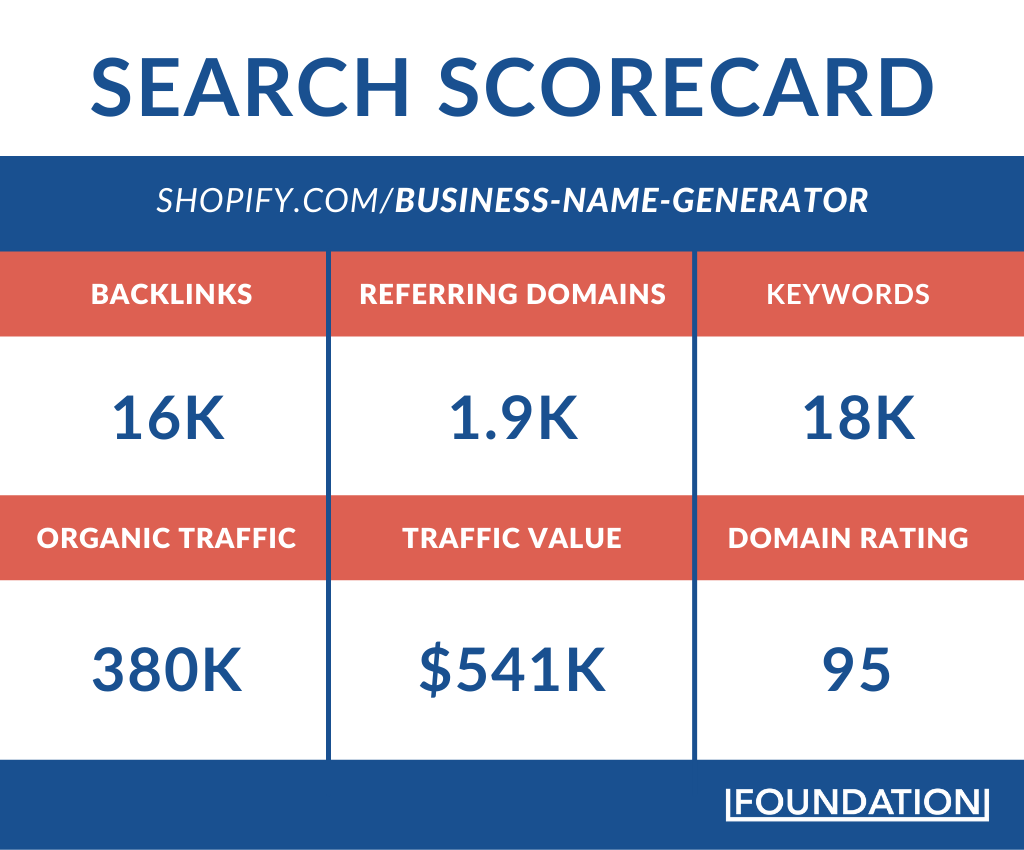
So this one tool drives about half of the traffic of their whole blog while ranking for about 4% of the number of keywords. This landing page needed only 3% of the number of backlinks to get there as well.
At its core, the Free Business Name Generator from Shopify helps someone pick the name of their new business and claim the domain name before they design their Shopify website.
It’s not some complicated tool that took them years to create; you could probably build a similar tool in an afternoon.
Yet it has helped them rank on 18k+ keywords, and drive 380k sessions at an e-commerce valuation of $540k per month.
So how did they do it?
We broke the whole process down.
Ranking On 18k+ Keywords, With One Free Tool
The practice of using free tools for lead generation is as old as the internet itself. However, most of these tools are used in ads or embedded in a related blog post.
Not many of these tools rank highly in search, outside of some famous examples like Hubspot’s Website Grader or some of Canva’s free tools. It’s a lot harder to make these tools rank in search, especially if you’re targeting highly competitive keywords.
According to Ahrefs, ranking first for just “business name generator” will drive about 100k sessions a month, so there were some big rewards for getting your tool at the top of a SERP.
However, you have to do something special to rank in those top spots. Shopify has done exactly that with their Business Name Generator tool.
Currently, the Shopify Business Name Generator ranks in the top spots for:
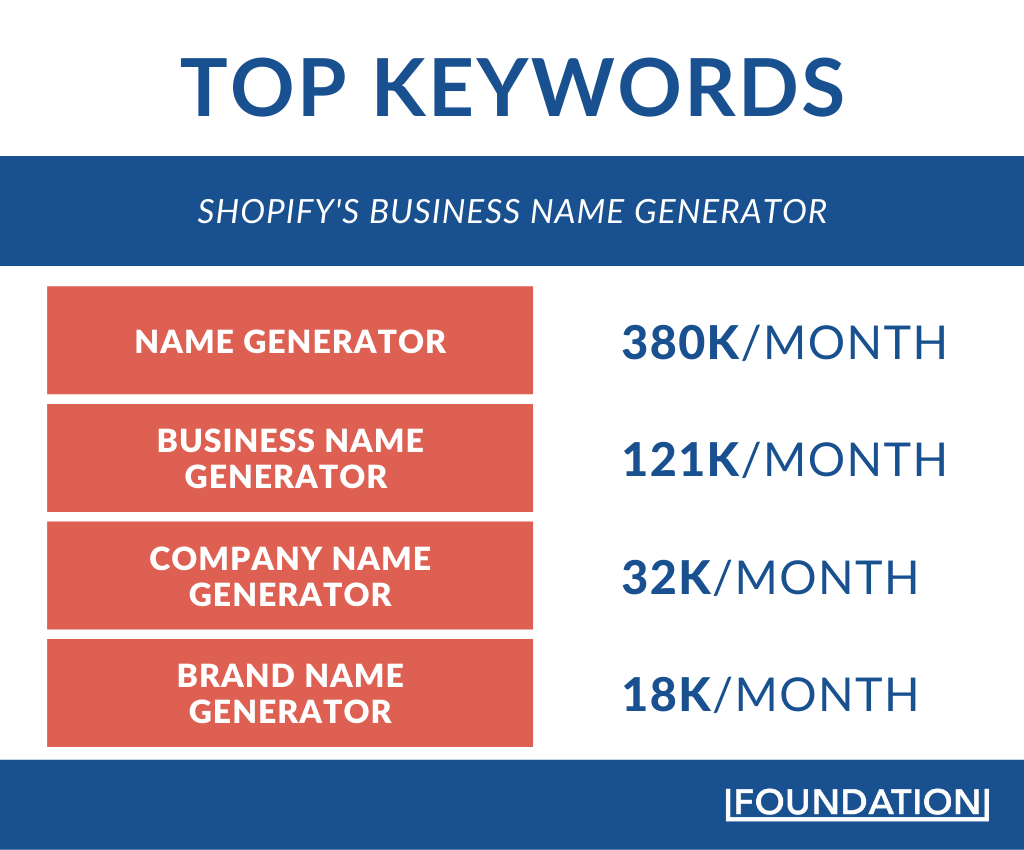
That’s super impressive, no matter how you look at it–especially on these extremely competitive keywords.
So how did they beat out the competition? They diversified, hard.
Shopify wanted to dominate the name generator space, no matter which industry searchers were looking to create a name within. If you needed a name for any business, Shopify wanted to be part of that process.
So they expanded their business name generator tool into nearly every conceivable niche to target a huge batch of long-tail keywords.
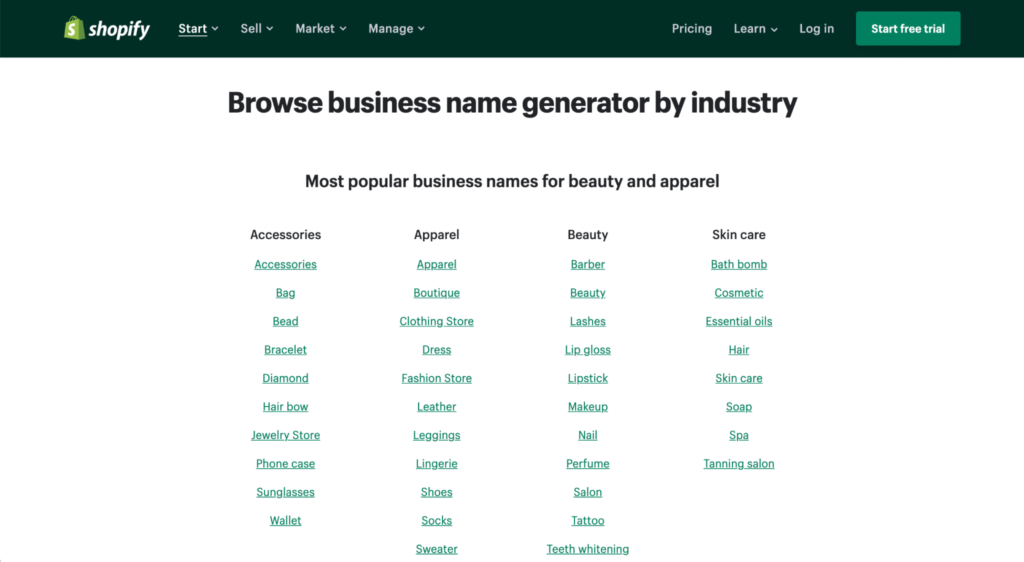
The first thing they did was massively expand their subdirectory structure to make it much easier to target important long-tail keywords. Take a look at this chart; in early 2021 they went from a handful of subdirectories to over 200 a few months later.
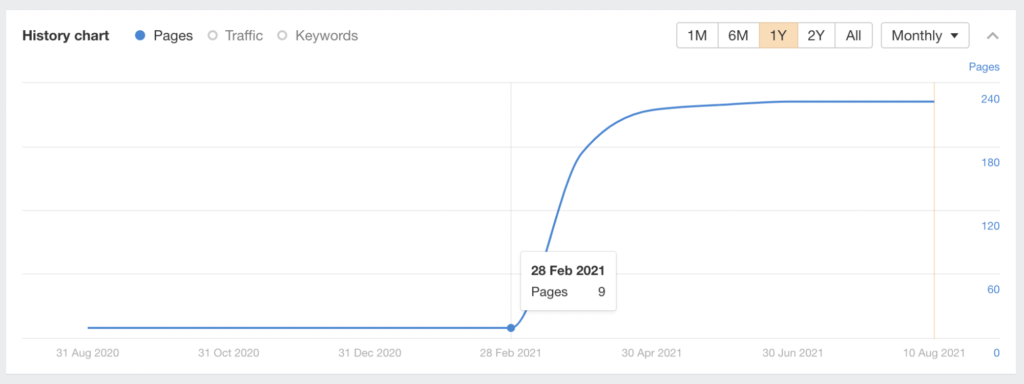
Now there are different business name generators for health brands, clothing stores, and even a bread business.
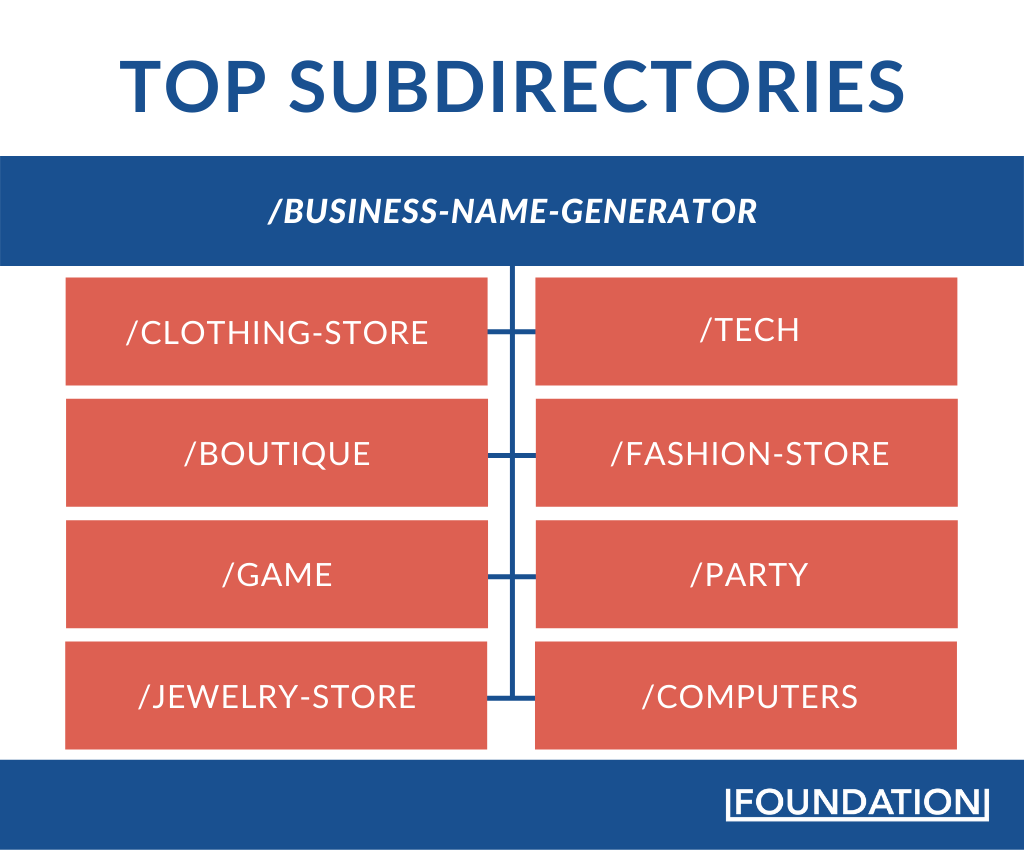
For those who aren’t aware, a subdirectory is basically a page that sits within your main home page. Here is a solid visual that explains how these subdirectories work:
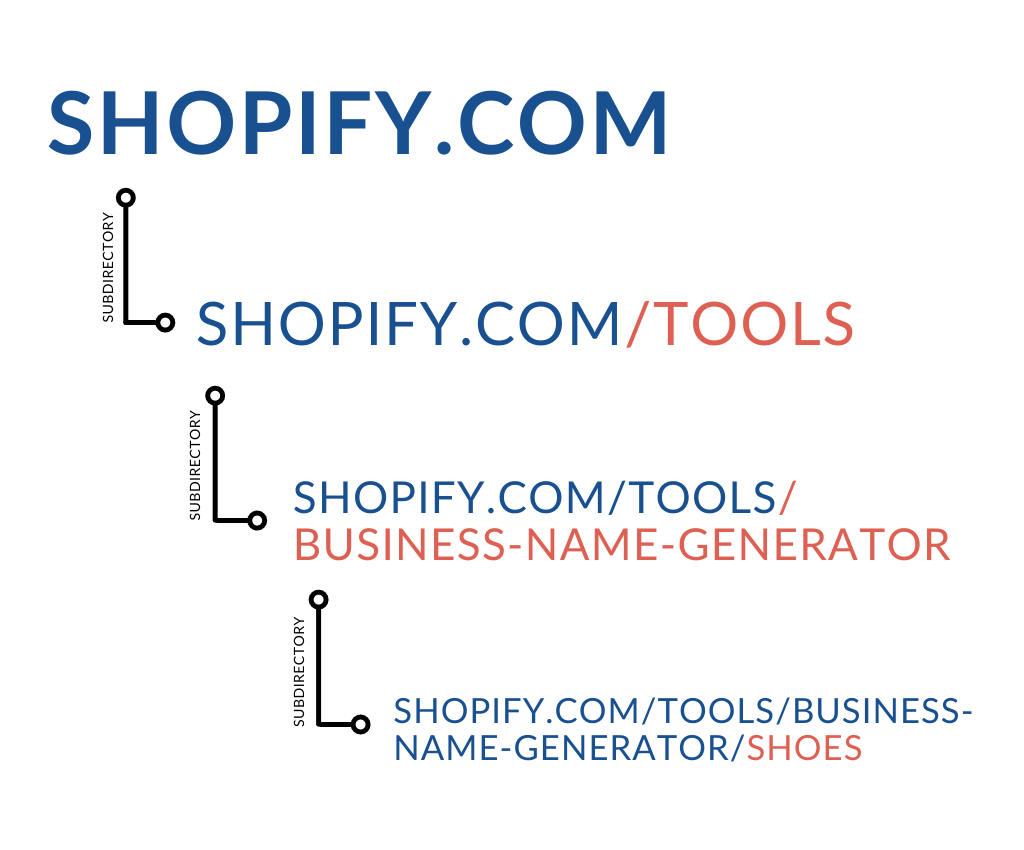
Structuring pages like this allows Google to better understand your site structure and better categorize your content or landing pages. And that leads to more traffic because your content will rank higher in search results!
Most of the traffic goes to the main Shopify Business Name Generator, but the landing pages for clothing stores and boutiques drive significant traffic.
But direct traffic wasn’t the point or the goal. Each subdirectory page shares the same backlinks, page/domain authority, and other ranking factors of the original root domain. So a link on the Bread Business Name Generator page would send “link juice” to the main Business Name Generator page as well.
Shopify also wanted to signal to Google that they were the best tool for the job by building a whole ecosystem around these name generators. Why else would they build a landing page for Gift Wrapping Business Names?
This expansion of the subdirectories was likely pushed forward because the main Business Name Generator landing page had started ranking on a lot fewer keywords.
In fact, in February 2021 it was at its lowest point over the past 2 years:

Competitors saw that Shopify had been coasting on a few name generator landing pages for years, and decided to take them on directly with more optimized landing pages.
For example, over the past year, the business name generator from How To Start An LLC jumped from driving about 20k sessions per month to over 200k sessions!
So Shopify responded in a big way.
Now the Business Name Generator is driving 5x the traffic of any of its competitors.
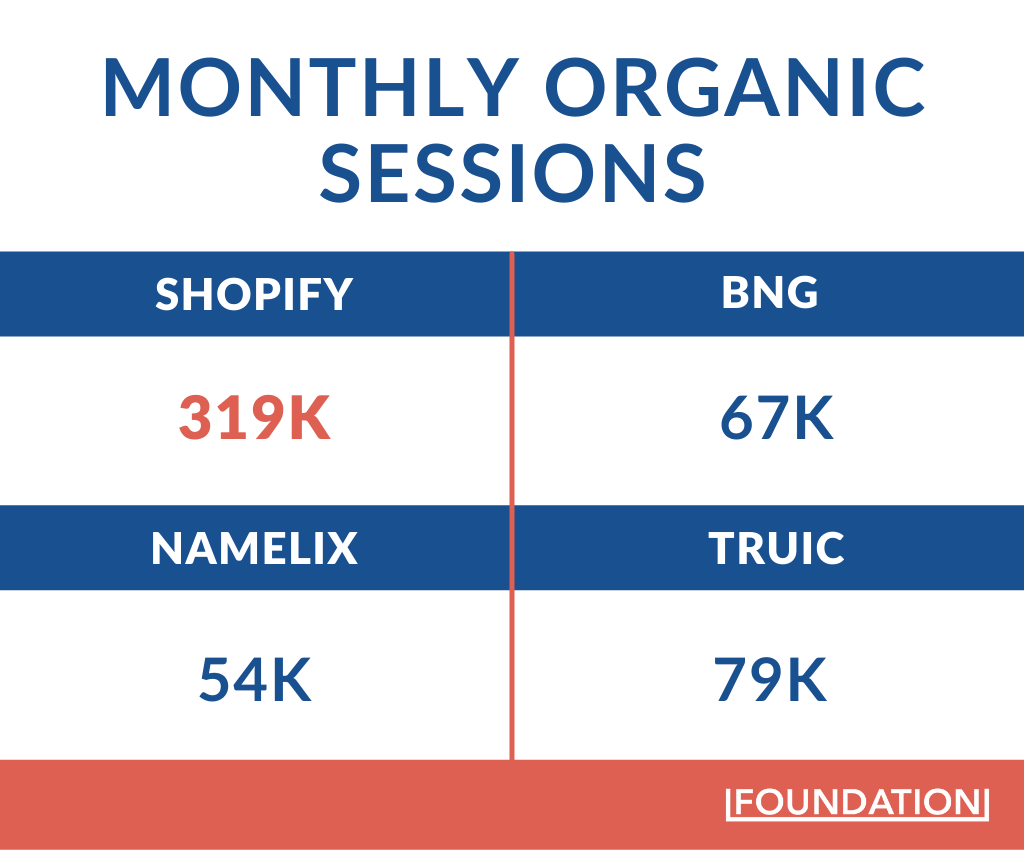
And best of all, every single one of these pages is basically the same. The name generator part of the tool functions exactly the same no matter what landing page you’re on. The only difference is the keyword they are trying to target.
Diversifying their subdirectories allowed Shopify to go after a ton of long-tail keywords that they couldn’t with the main name generator.
For example, with Clothing Store Name Generator they now rank in the first spot for:
- clothing brand name ideas – 1.5k monthly searches
- clothing line names – 1.1k monthly searches
- clothing brand name generator 1k monthly searches
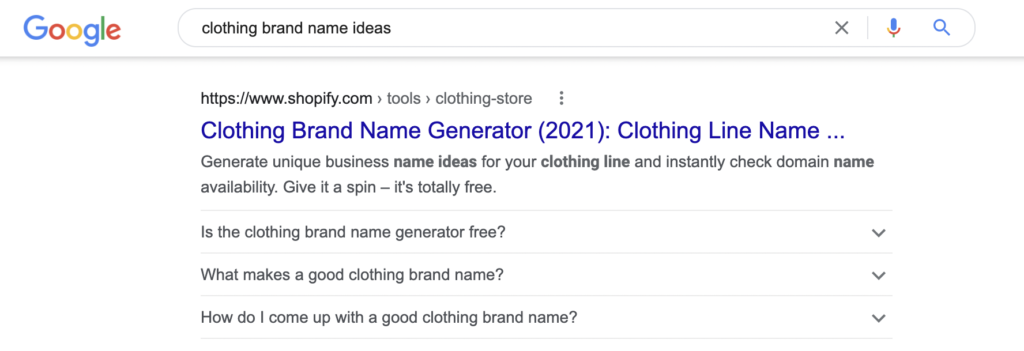
That search volume might not cause you to do a backflip, but when there are 200+ different pages targeting similar long-tail keywords with low keyword difficulty… it starts to add up.
Shopify’s Digital Marketing Business Name Generator page ranks on a keyword with only 100 searches per month, but ads for this keyword are running for almost $15 per click. That signals it’s a very lucrative keyword for some brands.
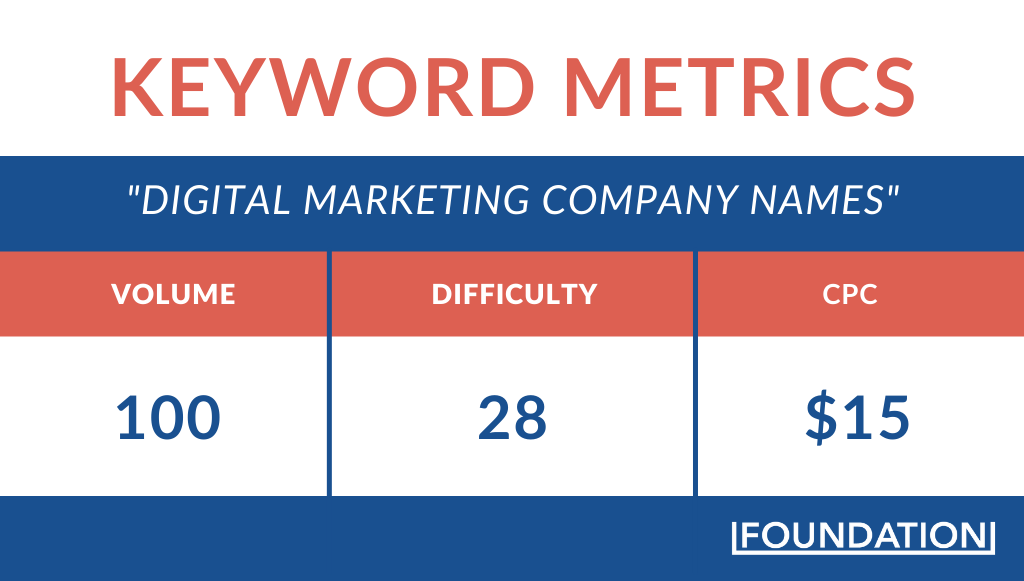
Brands that are going after this keyword can use that high cost per click to determine that someone who is searching for that likely will buy their product or service. Otherwise, the cost per click would be much lower because of low competition.
The high cost per click for long-tail keywords is another reason why Shopify has invested so much in expanding a relatively simple tool into new markets.
Want to Steal Shopify’s Strategy? Download this checklist!
By downloading this resource, you’ll also start receiving a few emails per week on B2B growth and content marketing
How Did They Build These 200+ Landing Pages?
I once created 50+ landing pages manually; it was a very tedious process that took an entire quarter. They were all basically the same page, with a few keywords or images changed.
Thankfully, Shopify didn’t follow in my foolish footsteps. Instead, they seem to have used a single landing page template and an automated process to create 200+ landing pages in record time.
All of these landing pages are based on the original Business Name Generator. The new pages use the exact layout, header images, Call To Actions, FAQ section, and more!
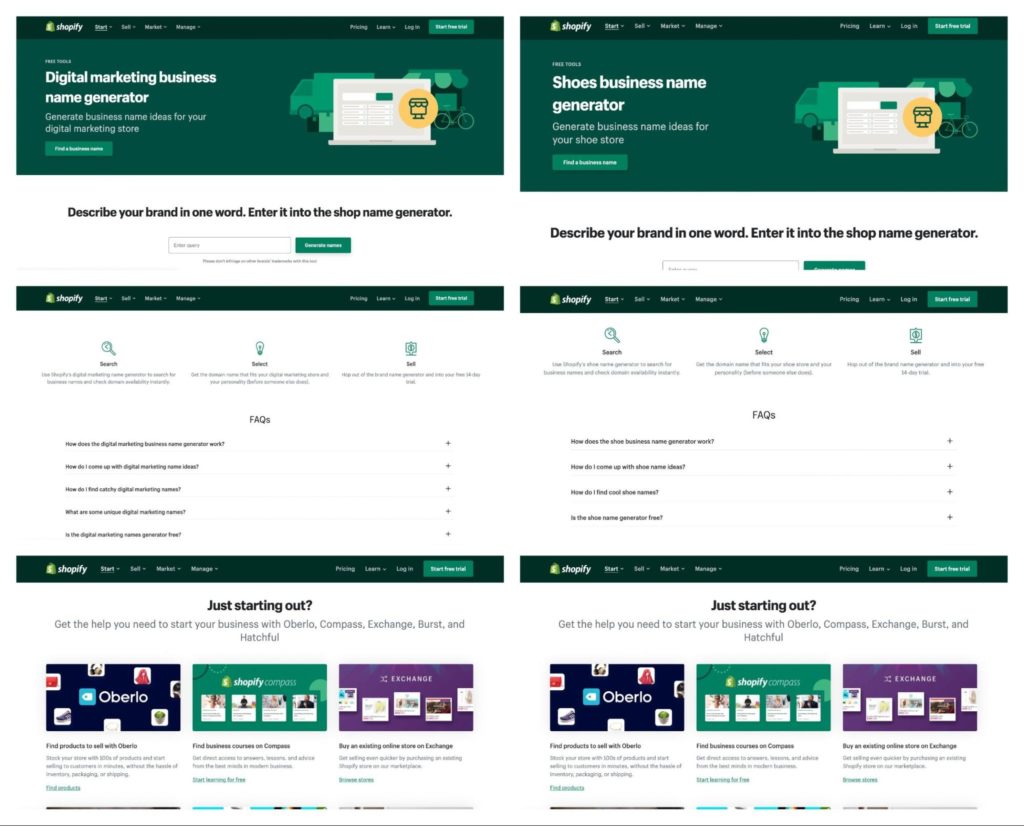
The main Business Name Generator page does include some extremely keyword-optimized copy that has probably helped it rank. It’s almost like a small blog post that they added below the tool. This isn’t seen on any of the other pages.
The only other thing that changes between all 200 or so pages is the keyword they want to target and some of the wording in the FAQ answers. For example, on the page targeting t-shirt business names, the header reads “Shirt business name generator,” but on the page targeting makeup business names, it reads “Makeup business name generator.”
It’s almost like Shopify took 200 different masks and slapped them on top of the Business Name Generator.
As simple as that sounds, it works. This repeatable page layout allows them to spin up any new landing page in a matter of minutes. All they need is a target keyword; and the heavy lifting is already done for them. They can quickly respond to trends, update a current landing page to be more keyword-friendly, or just add a few new long-tail keywords.
That’s probably the inspiration for the Bread Business Name Generator landing page over the past year. I mean, everyone thought they could start their own bread business after making a perfect sourdough during the lockdown.
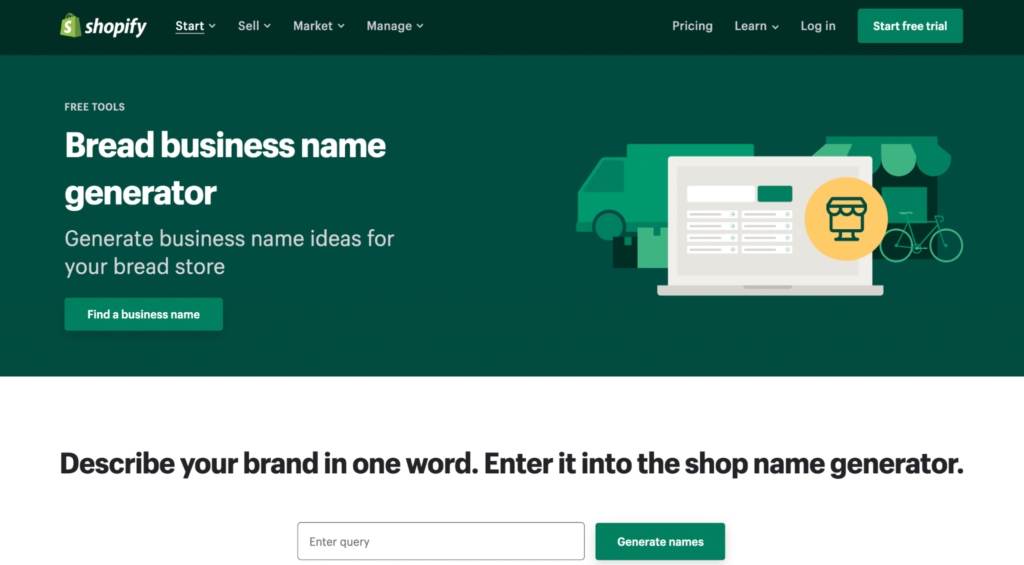
These somewhat different name generators are also a great way to test consumer demand. If there is a spike in traffic to a certain name generator landing page, like Fitness Business Name Generator, Shopify can respond by creating a bunch of new site templates or features catering to gym management / the fitness industry, before competitors can respond.
Another thing I like about the main Business Name Generator page is that Shopify includes links to all their other niche name generator landing pages:
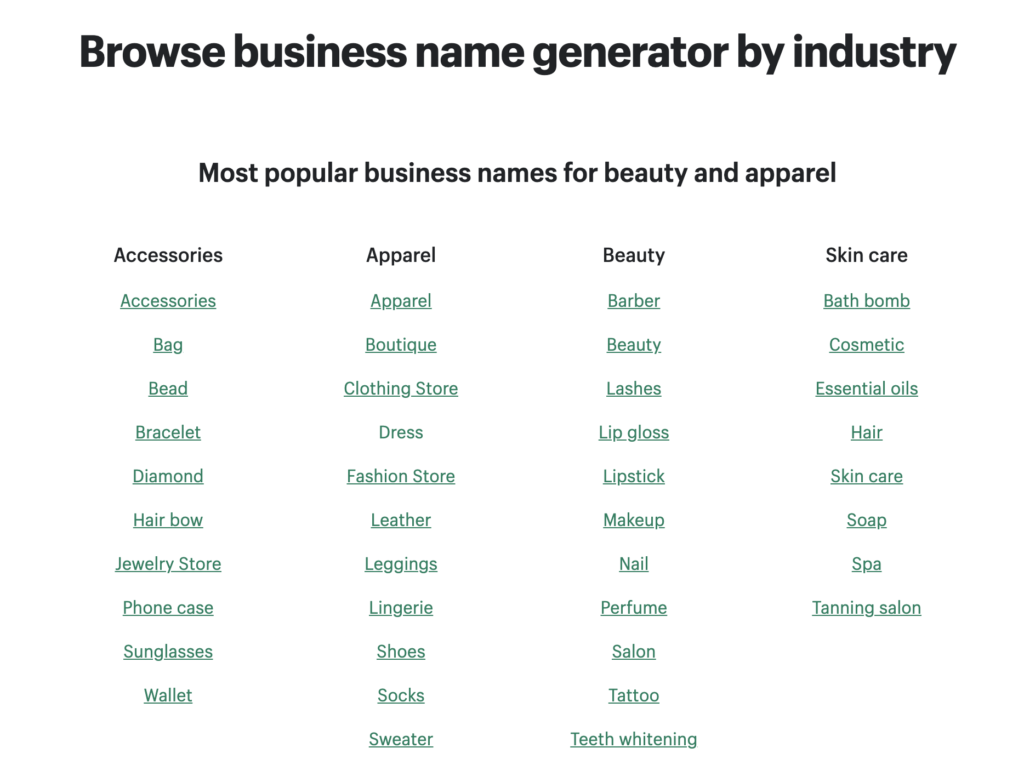
This internal linking structure is another signal to Google that Shopify is building a massive ecosystem of name generators, and that these other smaller pages are important.
This is likely why a page with less demand, like Craft Business Name Generator, can rank well, even without many backlinks. Without this internal linking structure, Shopify would be leaving a lot of ranking opportunities on the table.
Canva has taken a very similar approach to their various template landing pages as well. For example, when they want to launch a new template category like Halloween Poster Templates, they make sure it’s a subdirectory of their Poster Template category page.
As it did for Shopify, this approach has allowed Canva to rank on large keywords and on thousands of long-tail keywords. When it comes time to release a new page, they can use the power of the original template landing page, or name generator landing page, to boost the new page to the top of the rankings.
This approach is very simple, and other brands can copy it, but the way they both execute it is very impressive.
How They Convert Free Searches To Customers
This seems like a ton of effort to put into a free tool, right?
Wrong!
Shopify has also turned the Business Name Generator into a fancy sign-up form for their services, meaning that this form has the opportunity to turn every person who searches for a business name into a customer.
Even if the searchers don’t end up using the name generating tool, there are several other indirect ways Shopify guides a user towards signing up from that page.
We’re getting ahead of ourselves though. Let’s run through the direct flow first.
After you find the perfect business name using the business name generator, you can sign up for a companion Shopify storefront/site with a single click on the name of choice.
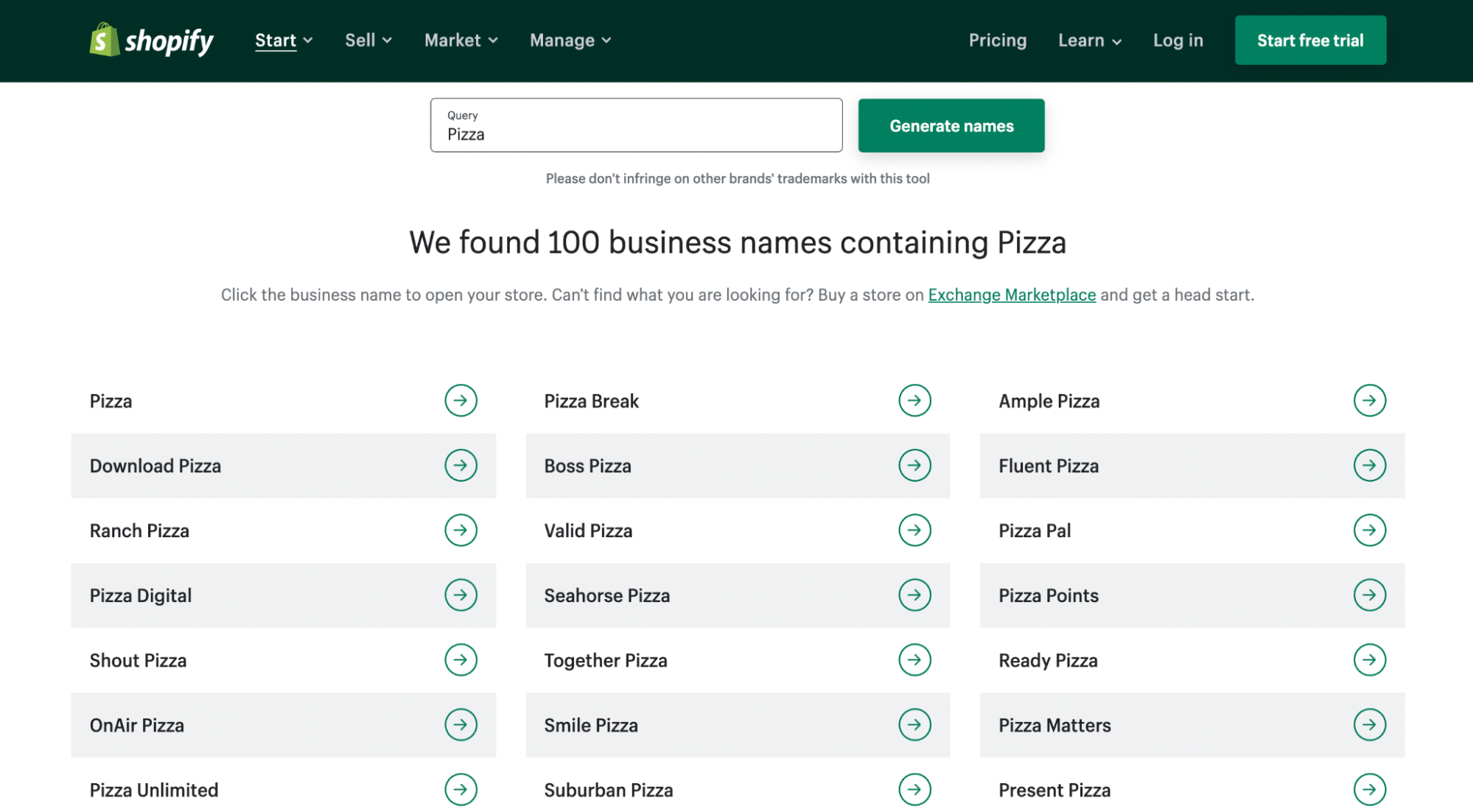
Then, all you have to do is enter your email, and Shopify will do the rest:
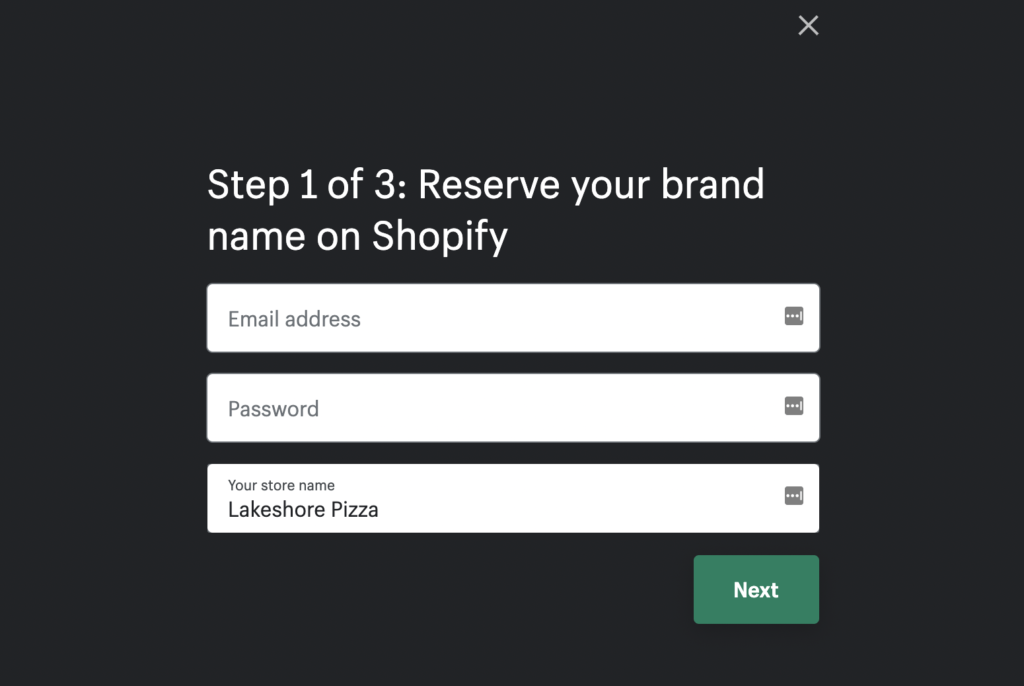
It’s probably safe to say that most people searching for a business name generator don’t have the budget or the technical expertise to build a website.
So when Shopify builds both the front end and back end of a storefront for them in a matter of seconds, it feels like magic. These people will likely remain Shopify customers for years because switching costs are too high.
Shopify has positioned these landing pages exceptionally well so that the right people are seeing them and getting value from the name generators. Even if someone doesn’t follow through and create their own site at that moment, it’s still a very valuable and qualified lead for Shopify.
These people have already:
- Shown interest in starting a business.
- Identified what kind of business they want to start.
- Selected a name for this business.
- Given Shopify their email address.
Shopify can do a lot with that information, especially when it comes to nurturing and turning these interested people into real customers.
Before they expanded to over 200+ landing pages, Shopify had to guess what type of business a user wanted to build. Now the user actually tells them by picking a specific business name generator.
Even if someone isn’t ready to pick a business name or open a shop, Shopify offers more valuable tools at the bottom of each name generator page:
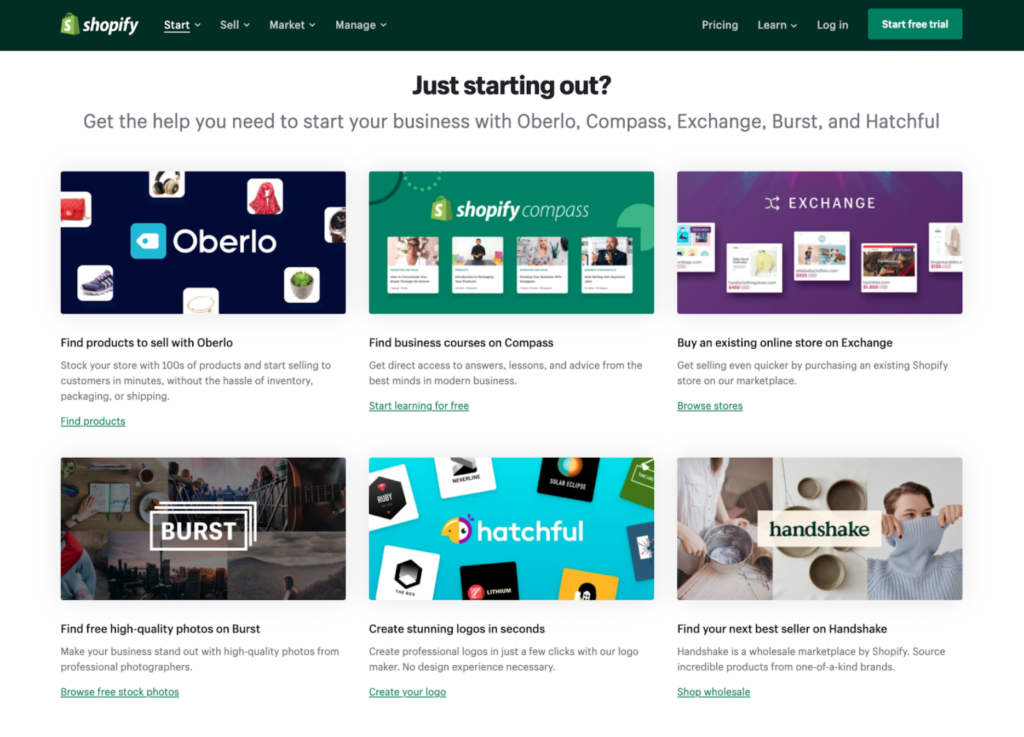
As you can see there are options to take business courses, buy an existing shop, find an actual supplier, create a logo using a logo maker from scratch, build out your stock photo library, and more.
These resources help answer a lot of common questions that a potential new business owner might have:
- How do I sell?
- What will I sell?
- How do I create a logo?
- How do I find a supplier?
- What if I’m not qualified?
- How do I start an online business?
These free resources help searchers overcome many common obstacles that could otherwise keep them from launching their shops. Shopify knows that these tools are valuable because they can push a new user into their marketing funnel.
As you start poking around their site, you can quickly see that it’s been built to take someone from the mere idea of a business to opening a storefront. Shopify wants to make it so that anyone, anywhere, can start a business. That promise is the primary focus of their main site header:
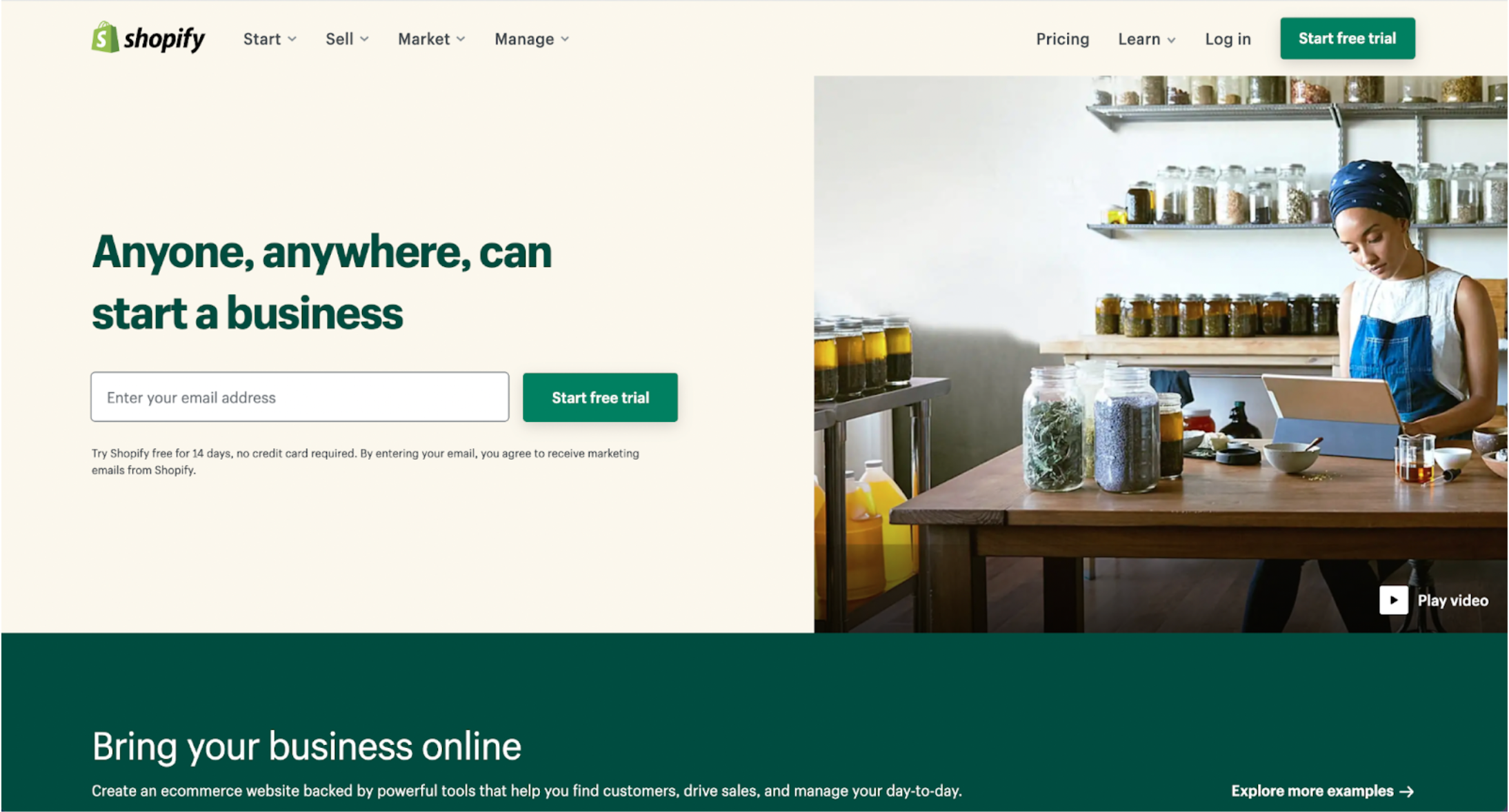
Going from Start, to Sell, to Market, and Manage in their navigation bar, Shopify has built out tools and content that can help a new business owner make their dreams a reality.
And the Business Name Generator moat that they have built is a powerful example of this commitment.
Want to Steal Shopify’s Strategy? Download this checklist!
By downloading this resource, you’ll also start receiving a few emails per week on B2B growth and content marketing
How The Rest Stack Up
Like I mentioned earlier, ranking for a handful of main keywords like business name generator or name generator is a huge challenge, but also has a huge reward. Shopify gets more traffic in a month from these tools than some generic SaaS sites get in a year!
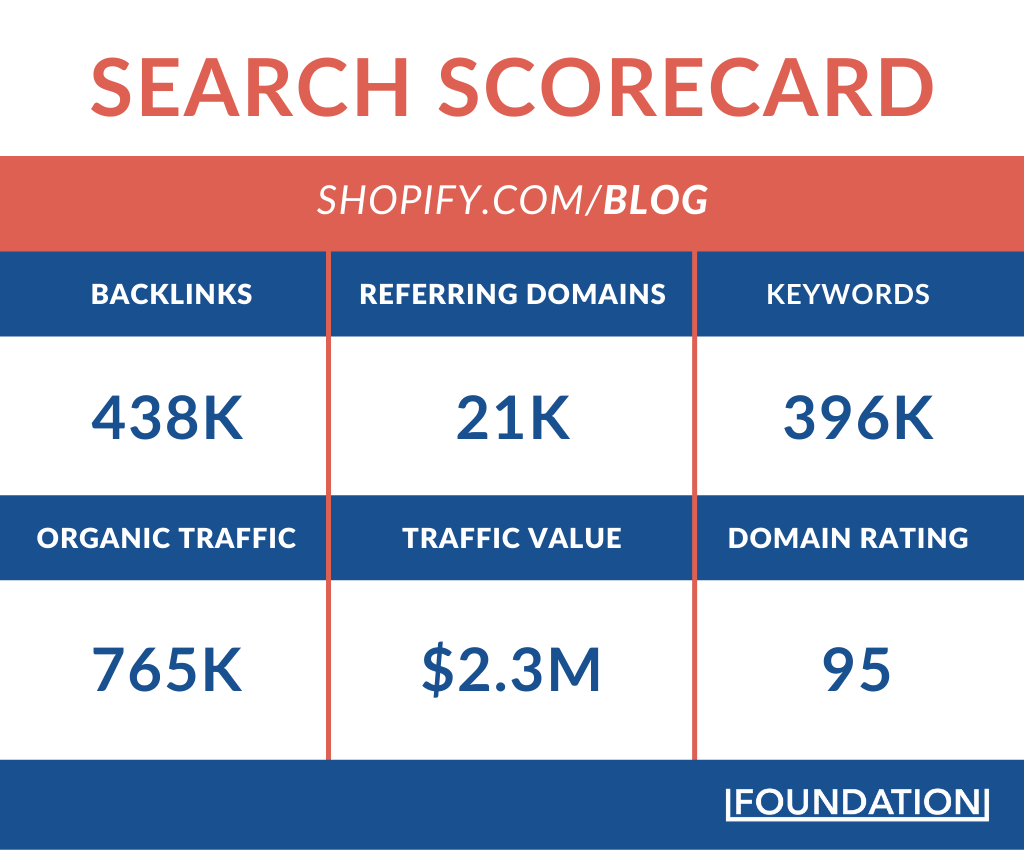
So how do the other brands gunning for that traffic stack up?
Four other brands rank at the top of most of the main keywords:
Little known fact: Oberlo is owned by Shopify, so they actually occupy two spots on these SERPs relatively easily.
The sign-up flow for Oberlo’s Business Name Generator is almost exactly the same as Shopify’s as well.
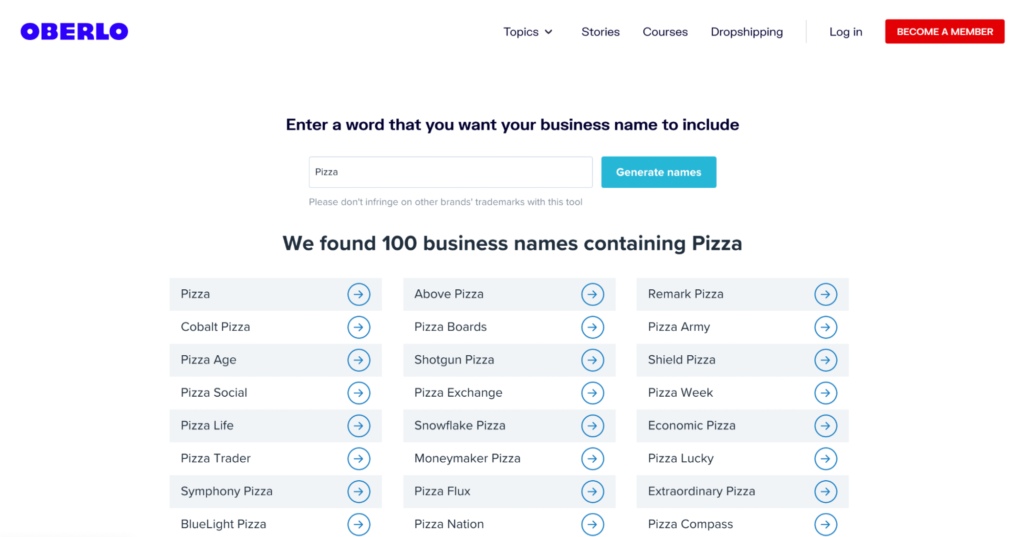
However, Shopify hasn’t put much effort into making the Oberlo version of the name generator rank. It’s currently ranking on the lowest number of keywords—and driving the least amount of organic traffic—since it was created in 2018.
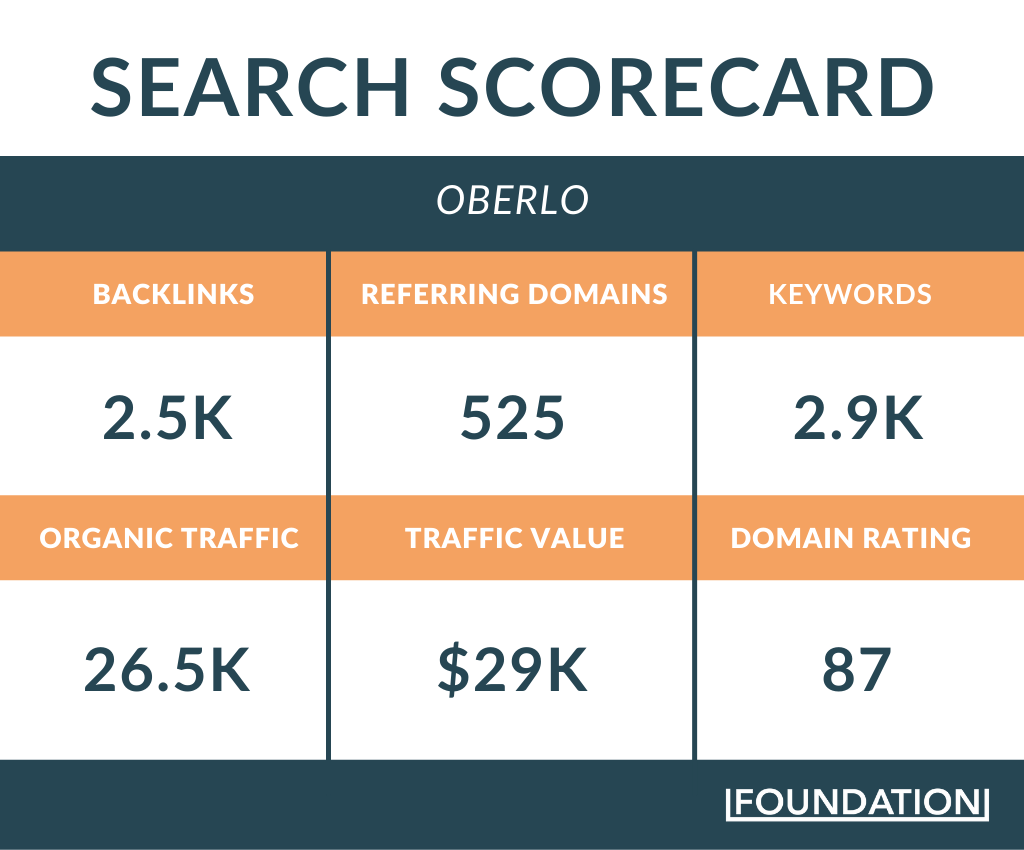
If I had to guess, it seems like Shopify is supporting this tool just so it can block competitors from ranking on competitive keywords. For example, on a keyword like “store name generator” with a volume of 7.1k, Shopify and Oberlo both have the top spots.
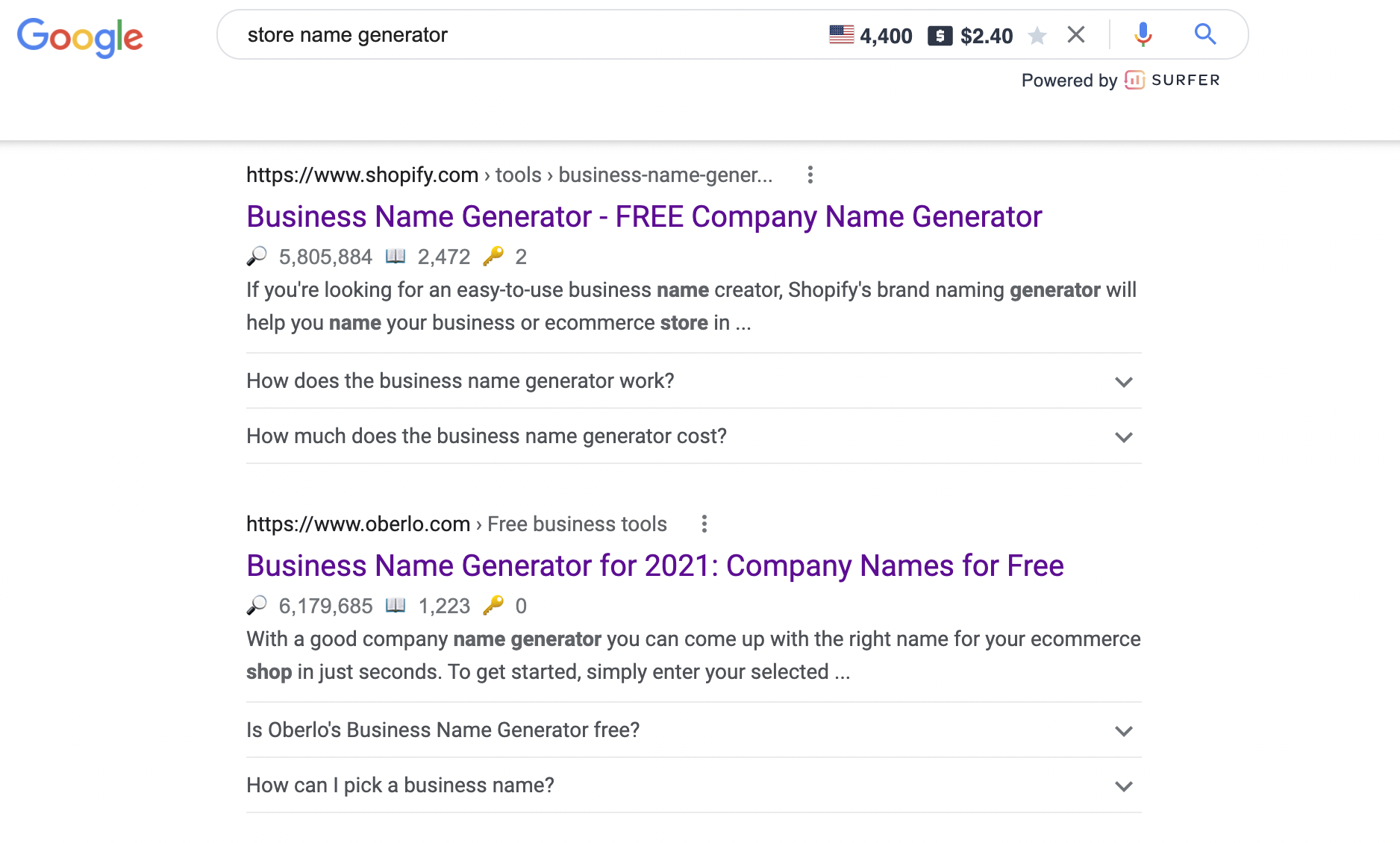
Next, let’s take a look at BusinessNameGenerator.com. Like Shopify, they can drive a ton of organic traffic while ranking on relatively few keywords.
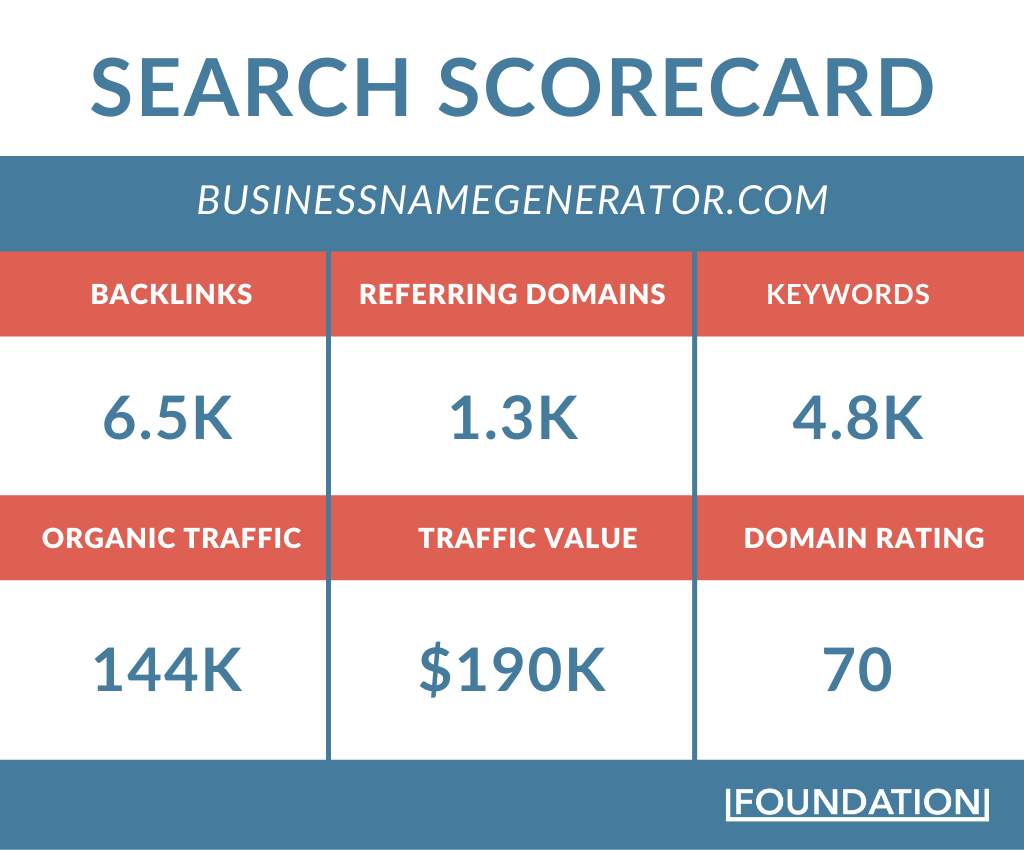
That said, they haven’t been able to target many generator keywords outside of the generic business niche because they only have a single landing page. This has caused them to not move up into the first spots of the most lucrative keywords like “business name generator” or “company name generator.” Their total organic traffic and number of ranking keywords reflect this. Both have dropped to their lowest levels since this time last year.
Next, let’s take a look at the business name generator from How To Start An LLC from TRUIC. They rank on about a third of the number of keywords as Shopify, but still drive a ton of traffic.
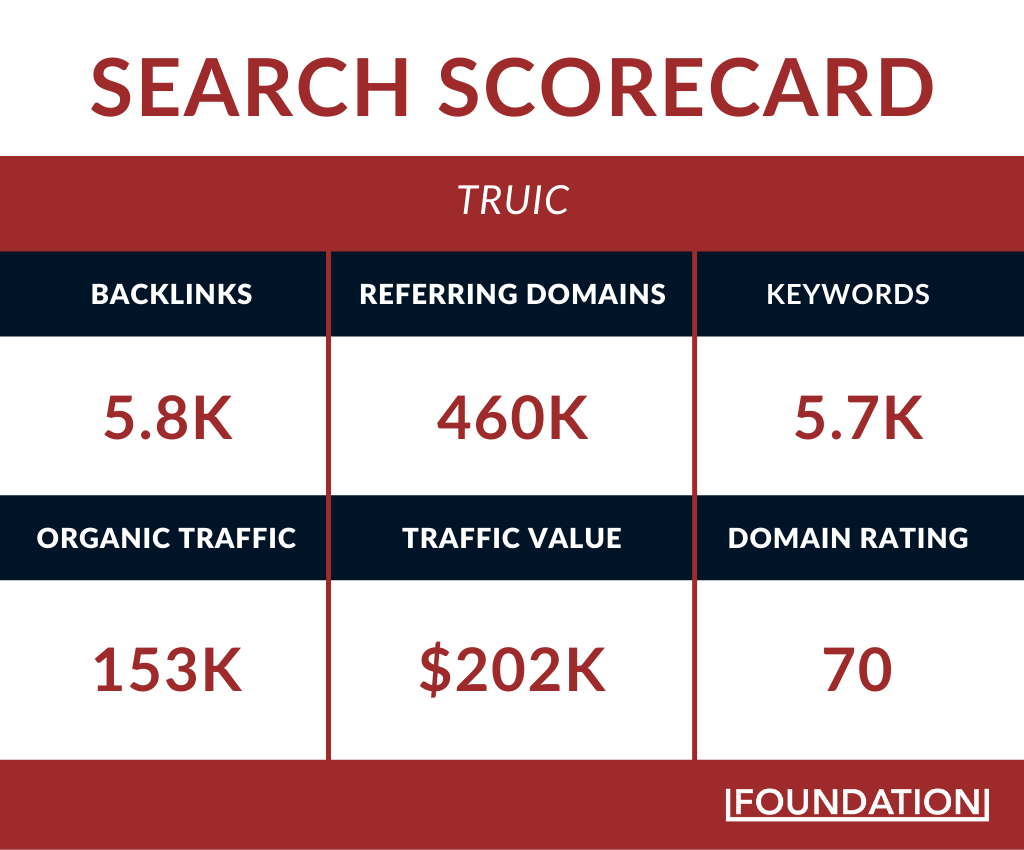
This is mainly because they rank in the first spot for “company name generator” which has a search volume of 32k. It hasn’t always been this way. Until a few months ago, they were only driving a few thousand sessions a day. And then their organic traffic took off like a rocket ship. Shopify doesn’t seem to have responded to this massive shift yet, but I’m guessing they will.
And finally, let’s break down Namelix, who I’m a big fan of, actually.
Like some of the other name generators, Namelix only has one landing page that they are trying to rank for tens of thousands of long-tail keywords. But, like Shopify, this brand offers a little more than just a cool business name.
Through some design automation, they create a whole logo based on the business name ideas!
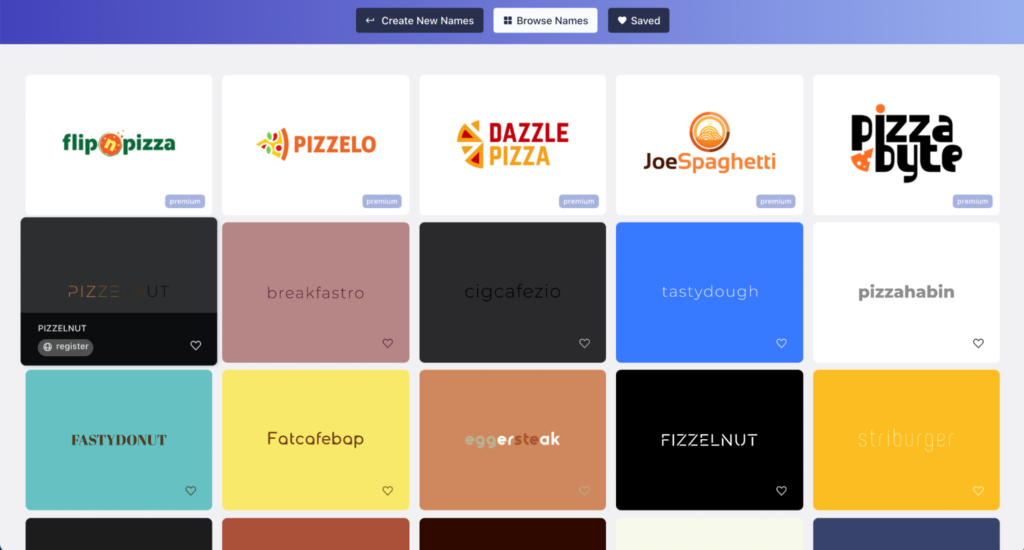
I love this approach because it feels like magic to the people searching for a business name, just like how Shopify automatically builds someone a storefront in a few seconds.
However, this snazzy design trick doesn’t help them outrank Shopify, and this page only drives about half the traffic of Shopify’s page:
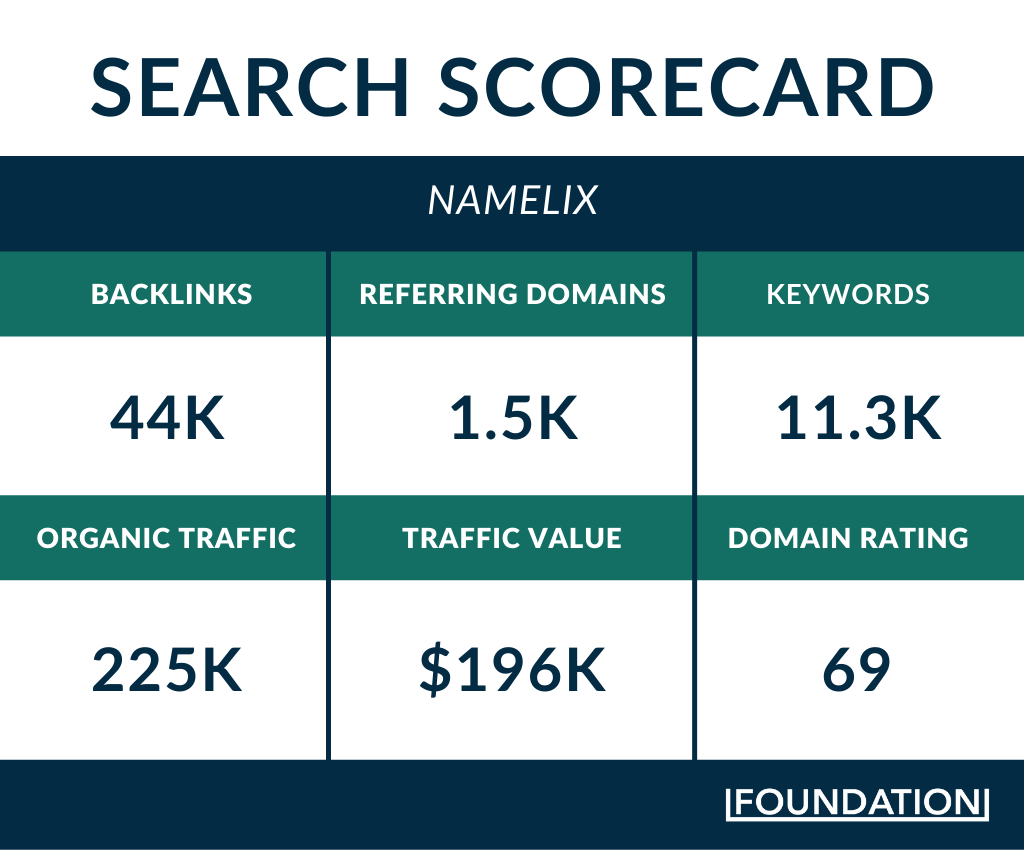
But, for brand name generators, and the related long-tail keywords, Namelix actually does outrank Shopify. This makes a lot of sense since Namelix is owned by BrandBucket. They have positioned themselves as a tool that helps a business owner build their brand.
Wrapping it up
I don’t think you notice the brilliance of the multiple landing pages and targeting from Shopify until you start looking at the competition. Or lack thereof.
The other brands have no subdomains or subdirectories sending “link juice” to the main business name generator. They don’t have landing pages targeting extra long-tail keywords. These brands don’t want to turn the searchers into customers. They just want to make a buck from an affiliate deal or advertising.
On the other hand, Shopify has quickly expanded its business name generators to target a large collection of long-tail keywords with optimized landing pages that drive key customers to their paid subscription plans.
They have also positioned themselves perfectly to target the right type of users who are at the beginning of their journey to becoming business owners. Even if these users aren’t ready to become customers, Shopify has a ton of other helpful tools they can use to get closer.
It might seem like a lot of work, especially for one type of keyword. But Shopify has basically been able to beat every company to the top of those SERPs and drive 380k+ monthly sessions to glorified lead-capture tools parading around as business name generators.
Quick, do it now before the next drop!








